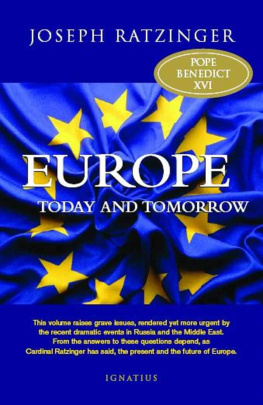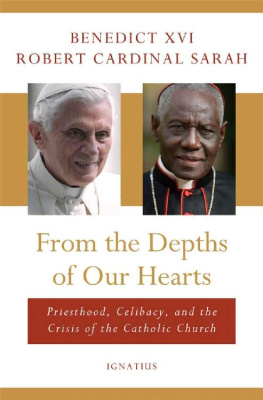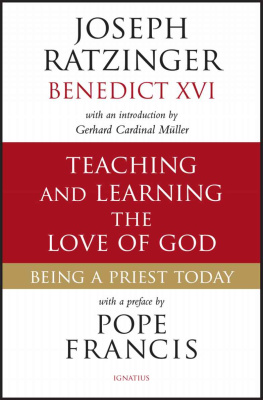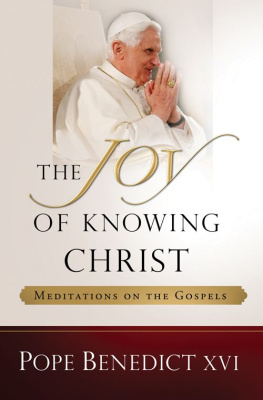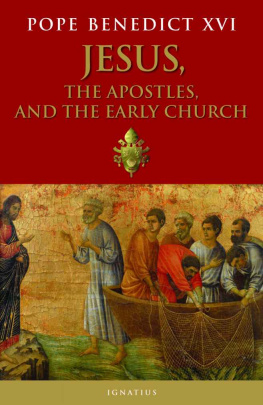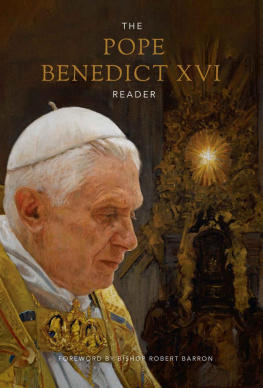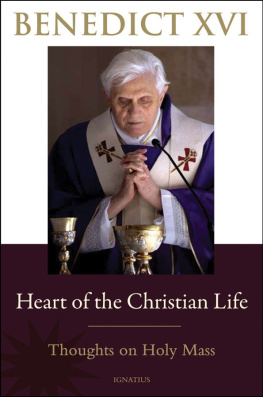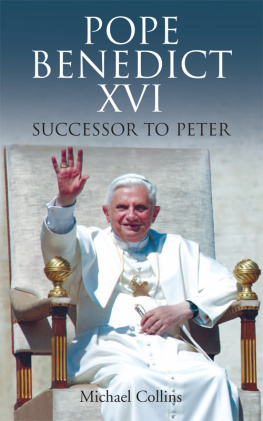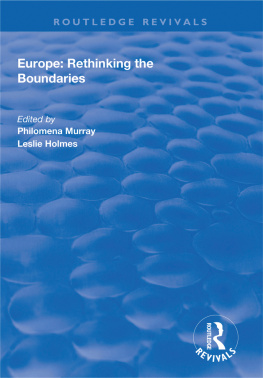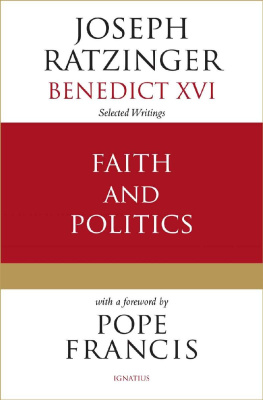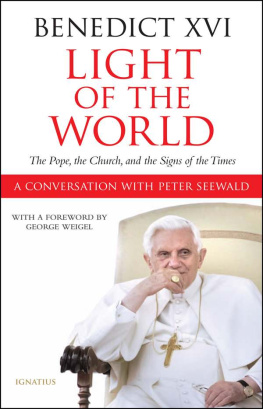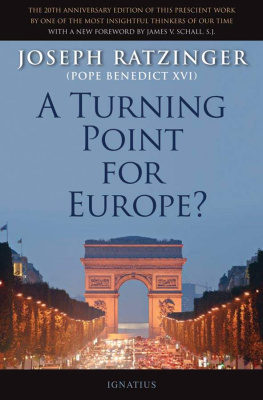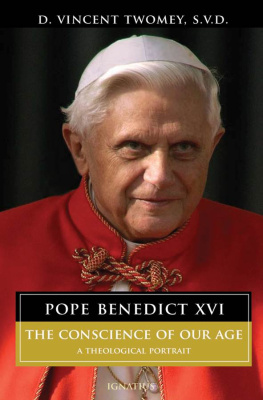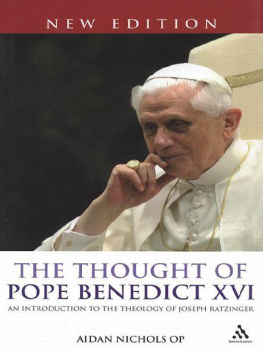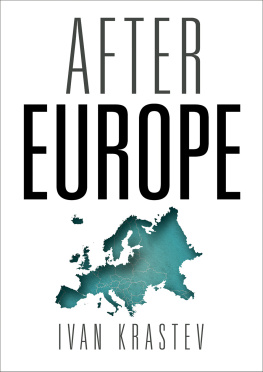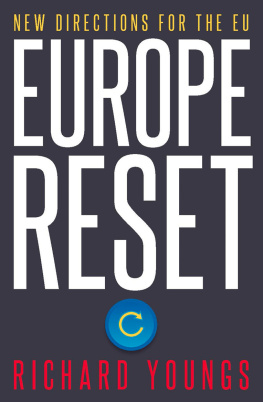Europe Today and Tomorrow
Joseph Cardinal Ratzinger
Europe
Today and Tomorrow
Addressing the Fundamental Issues
Translated by Michael J. Miller
IGNATIUS PRESS SAN FRANCISCO
Title of the Italian original:
Europa: I suoi fondamenti oggi e domani
2004 by Edizioni San Paolo, Cinisello Balsamo (Milan)
Second edition: 2005
Front cover photograph
Chmura Frank / PRISMA
Cover design by Roxanne Mei Lum
2007 by Libreria Editrice Vaticana
2007 by Ignatius Press, San Francisco
All rights reserved
ISBN 978-1-58617-134-6
ISBN 1-58617-134-8
Library of Congress Control Number 2006936322
Printed in the United States of America
CONTENTS
WHAT IS EUROPE?
POLITICS AND MORALITY
RESPONSIBILITY FOR THE PEACE
Four talks on the occasion of the sixtieth anniversary of the landing of the Allied forces in France
PREFACE
Europe is no less a current issue than it was when I published my first book on the subject ( Wendezeit fr Europa ? 1991). Over the course of the years, though, attention has been focused increasingly on the question of the general foundations of political action. Therefore the theme of Europe can be addressed now only within the context of the global challenges of our time. For my part, without seeking such occasions, I have been invited repeatedly during the past decade to give conferences on this subject. That is how the various chapters that together make up this little volume were produced.
Whereas the first essay attempts to clarify once again the question of what Europe is, what it can be, and what it ought to be, the other texts address the question of the criteria for correct political action against the background of the present European and global situation. Although it has not been possible in this anthology to avoid overlapping and repetition, I hope that a new collection of these individual statements will afford a better overview. On the other hand, I am fully aware of how inadequate the attempts presented in this volume are in dealing with the important questions of today that affect us all. Nevertheless, I hope that they can help to sharpen the vision of what is helpful and what is harmful.
JOSEPH RATZINGER
Rome, July 23, 2004
Feast of Saint Bridget of Sweden, Co-Patroness of Europe
PART ONE
WHAT IS EUROPE?
Europe:
Its Spiritual Foundations
Today and Tomorrow
Europewhat is it exactly? This question was asked again and again, expressly, by Cardinal Jzef Glemp in one of the language circles of the Synod of Bishops on Europe: Where does Europe begin, and where does it end? Why, for example, does Siberia not belong to Europe, even though it, too, is inhabited by Europeans, whose way of thinking and living is, furthermore, quite European? And where do the frontiers of Europe disappear to the south of the community of peoples called Russia? And along what line of demarcation does its boundary run in the Atlantic Ocean? Which islands are Europe, and which ones are not, and why not? In those meetings it became perfectly clear that Europe is a geographical concept only in a way that is entirely secondary. Europe is not a continent that can be comprehended neatly in geographical terms; rather, it is a cultural and historical concept.
1. The rise of Europe
This becomes quite clear if we try to go back to the origins of Europe. Those who speak about the origin of Europe usually cite Herodotus (ca. 484-425 B.C.), who was no doubt the first to be acquainted with Europe as a geographical concept; he defines it as follows: For Asia, with all the various tribes of barbarians that inhabit it, is regarded by the Persians as their own; but Europe and the Greek race they look on as distinct and separate. The boundaries of Europe itself are not specified, but it is clear that lands which today are the nucleus of modern Europe lay entirely outside of the area considered by the ancient historian. Indeed, with the establishment of the Hellenistic states and the Roman Empire, a continent had been formed that became the basis for later Europe, although it displayed entirely different boundaries: these were the lands surrounding the Mediterranean, which by virtue of their cultural ties, by dint of trade and commerce, and by reason of their common political system formed all together a true and proper continent . Only the triumphant advance of Islam in the seventh and at the beginning of the eighth century drew a boundary across the Mediterranean and, so to speak, cut it in half, so that all that had been one continent until then was thenceforward subdivided into three continents: Asia, Africa, and Europe.
In the East the transformation of the world of antiquity took place more slowly than in the West: the Roman Empire with Constantinople as its center held out therealthough under increasing pressure on its frontiersuntil the fifteenth century. Whereas around the year 700 the southern part of the Mediterranean fell completely outside of what had hitherto been a cultural continent, one notes at the same time an ever more vigorous extension toward the north. The limes , which until then had been a continental boundary line, disappears and opens up toward a new historical space that embraces Gaul, Germany, Britain as lands forming a true and proper nucleus, and it extends ever farther toward Scandinavia. In this process of displacing boundaries, the conceptual continuity with the preceding Mediterranean continent, although measured geographically in different terms, was assured by a theological interpretation of history: in connection with the Book of Daniel, the Roman Empirerenewed and transformed by the Christian faithwas considered to be the final and permanent kingdom in the history of the world in general, and therefore the association of peoples and states that was taking shape was defined as the permanent Sacrum Imperium Romanum [Holy Roman Empire].
This process of a new historical and cultural definition was completed quite deliberately during the reign of Charlemagne, and here the ancient name of Europe emerged once again, in a significant variation: this term was now used precisely to designate the kingdom of Charlemagne, and it expressed simultaneously the awareness of the novelty and the continuity with which the new association of states presented itself as the political power in charge of the future. In charge of the future because it considered itself to be in continuity with the history of the world thus far and ultimately to be rooted in what lasts forever.
Expressed in the self-understanding that was developing in this way was an awareness of being definitive and at the same time an awareness of having a mission.
It is true that the concept of Europe almost disappeared again after the end of the Carolingian rule and was preserved only in the language of the learned; it passed into the popular language only at the beginning of the modern erano doubt in connection with the threat from the Turks, as a means of self-identificationand it became generally accepted in the eighteenth century. Independently of this history of the term Europe, the establishment of the kingdom of the Franks, as the Roman Empire that had declined and was now reborn, signifies, indeed, a decisive step toward what we mean today when we speak of Europe.
Of course we cannot deny that there is also a second root of Europe, of a non-Western Europe: as already noted, the Roman Empire in Byzantium had effectively resisted the storms of migrating peoples and of Islamic invasion. Byzantium always understood itself to be the true Rome; here, in fact, the empire had never declined, which was why it continued to assert a claim in its disputes with the other, western half of the empire. This eastern Roman Empire, too, extended farther to the north, until it reached the Slavic world, and it created its own Greco-Roman world, which differs from the Latin Europe of the West in its liturgy, its ecclesiastical constitution, its alphabet, and by its renunciation of Latin as the language of the learned.
Next page
